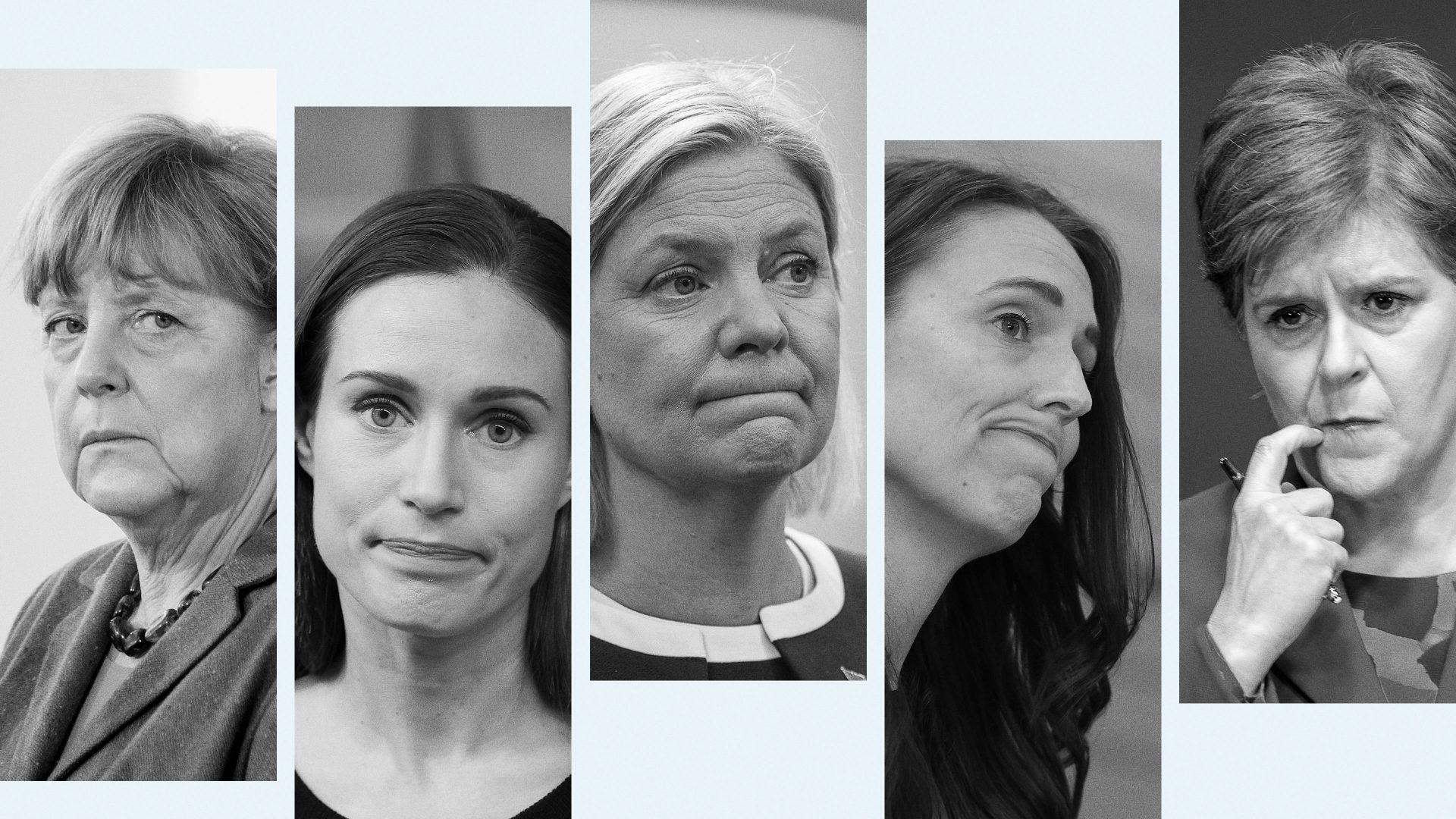When Nicola Sturgeon announced her resignation as Scotland’s first minister last week, there was general surprise, tinged with sadness for some, glee for others – for Sturgeon was polarising, as she herself admits. But for those seeking greater female representation in politics there was an additional sense of loss.
Loss that, only weeks after the resignation of New Zealand’s internationally respected prime minister Jacinda Ardern, another strong woman leader was quitting the limelight – and in a country whose political leadership was overwhelmingly female just over six years ago. “In the 2016 elections four out of five party leaders were women, now there’s only Lorna Slater of the Scottish Greens left,” Dr Meryl Kenny, senior lecturer in gender and politics at Edinburgh University told me.
When she came to power in 2014, Sturgeon was seen as a breath of fresh air in a very male-dominated political landscape and she had been cited as a role model by the many young women who subsequently engaged with politics. “Sturgeon was an openly feminist leader who talked about girls and women and gender equality,” Kenny said. “She positioned herself as very much leading as a woman.”
Such role models are fewer now. Sturgeon and Ardern are only the latest of a line of powerful women leaving the public eye, from Sweden’s Magdalena Andersson, ousted by a far-right supported alliance last year, to Germany’s Angela Merkel, who quit office in 2021. In the UK, two women prime ministers have come and gone since 2016, while Finland’s youthful premier Sanna Marin might lose power this year. Even Queen Elizabeth, who ensured that for 70 years there was at least one woman in those samey pictures of global leaders, is no longer with us.
At lower levels, where future leaders are formed, there is also movement. British women MPs stood down in 2019 at a younger age and after less time in parliament than the men who still dominate the green benches. Are the strides made by women in politics in recent years – in itself the result of decades of effort – going into reverse?
This depends on what comes next. But the atmosphere is toxic. Reports of sexual harassment and discrimination, as well as outright violence, against women are in the news and some of the worst perpetrators are even in the police force. As boorish men such as Donald Trump continue to hog the airwaves and misogynists like Andrew Tate groom swathes of young men online, there’s a desperate need for female role models who succeed nevertheless and challenge these social norms.
Role models have an outsize benefit for women who have had to contend with gender bias, negative stereotypes and institutional barriers. It matters what they do, but just seeing them there also helps. Even the late “dutiful” Queen wasn’t averse to a bit of feminist trolling, such as pointedly driving the Saudi Crown Prince in her Land Rover while his countrywomen were banned from doing the same. During Margaret Thatcher’s long premiership, children would ask if men were allowed to do her job.
But a woman in office was never the end of the struggle. In some ways it’s only the start. Given the numerous reports of vitriol faced by even the highest-profile women in the 21st century, it’s a wonder they make it as far as they do. Even Nadine Dorries, nobody’s delicate flower, says she wouldn’t recommend politics to women.
“I believe that the abuse female politicians suffer will have a detrimental impact on girls and women wanting to enter politics, it will likely deter them,” the barrister Charlotte Proudman, who specialises in violence against women, told me. Female leaders must work twice as hard, trying to prove themselves in a male-dominated political profession while coping with problems men never face, including the “daily onslaught of rape and death threats”.
Vocal, opinionated women in the public eye are still threatening to some men, she said. Neither said that a sense of physical threat influenced their decision to step down, but both Ardern and Sturgeon spoke of the toll taken by greater hostility and the “brutality” of modern political discourse.
Last year, serious threats of violence against Ardern trebled, especially among conspiracy theorists and anti-vaxxers. Helen Clark, New Zealand’s first female elected leader, said what her successor had faced was “unprecedented in this country… Our society could now usefully reflect on whether it wants to continue to tolerate the excessive polarisation which is making politics an increasingly unattractive calling.”
Sturgeon faced jibes about a miscarriage she suffered in 2011 and calls for her assassination. Before her resignation, she said she was “deeply” worried about the level of hostility and threats of sexual violence experienced by women.
According to a report released last month by the Fawcett Society, A House for Everyone, 69% of women MPs had witnessed sexist behaviour in parliament in the past five years, 93% said online abuse or harassment had a negative impact on how they feel about being an MP. Only 37% found parliamentary culture “inclusive for people like me”.
Hardly surprising, given that a significant number of MPs have been suspended or investigated for sexual misconduct. Caroline Noakes, the Conservative chair of the Women and Equalities Select Committee, talks of witnessing a deliberate belittling of women in parliament. Labour’s Stella Creasy, who was reprimanded for taking her three-month-old to a Commons debate because she didn’t have maternity cover, has received sexualised threats – including gang rape – ever since she entered student politics.
Social media makes this so much worse, given its greater reach, opportunity for amplification and the anonymity it provides the abusers, who lurk permanently in the digital shadows. In 2018, while calling for misogyny to be a hate crime, SNP MP Mhairi Black explained: “I’ve been assured multiple times that I don’t have to worry because I am so ugly that no one would want to rape me. All of these insults have been tailored to me because I am a woman.”
The phenomenon is international, both online and off. Taiwan’s president Tsai Ing-wen has been called “emotionally unstable”, attacked for not having children, and told by a member of her own party to stand aside for a man and become “mother of the nation” instead. Hillary Clinton was told her voice was loud and annoying, her clothes were bad and her expression grumpy. Kamala Harris was accused of “sleeping her way to the top”. Both Finland’s Marin and Sweden’s Andersson – and their female political allies – have seen their regular dose of abuse increased recently through targeted attacks by the far-right, who prefer someone “macho”.
Women are presented as frivolous. Marin was vilified and had to take a drug test (negative) after a video showing her dancing energetically with friends was leaked then amplified by a Finnish far-right platform. “I haven’t missed a single day of work and haven’t left a single task undone,” she said, as in the UK, Michael Gove’s peculiar dancing was celebrated. Former Danish prime minister Helle Thorning-Schmidt found herself dubbed “Gucci Helle” for her dress sense. Do none of the men, such as Emmanuel Macron or the slick former Austrian chancellor Sebastian Kurz, wear posh suits?
Women also tend to be the victims of a faster opinion switch than men, according to Professor Michelle Ryan, a leading Professor of Social and Organisational Psychology, who discovered the concept of the “Glass Cliff”: “I think (Liz Truss) is an interesting example of a glass cliff – a woman taking on a leadership position in times of crisis where the risk of failure is high (entirely apart from whether one thinks she did well in the role or not),” Ryan told me. “Research on the glass cliff does suggest that having women in roles in times of crisis may act as a cautionary tale for other women who may be put off from seeking leadership positions.”
Yet amid the hate, women have also been singled out as competent, especially during the pandemic when leaders such as Ardern, Marin and Tsai Ing-wen, acted swiftly, considered evidence and avoided petty ideological stands over masks to prevent excess deaths.
This all feeds into an idea of women as calmer and more dignified, reinforced by Sturgeon and Ardern’s manner of leaving. Their decision to resign with quiet, self-deprecating dignity, admitting they’d run out of steam for a job that required their full attention, came in stark contrast to the tantrums of Trump and Johnson.
Both women emphasised the importance of collaboration, compassion and wellbeing, pushing through changes in support of women and families, even though many women lined up against Sturgeon’s latest controversial gender recognition bill. Merkel, although a different kind of politician altogether, has prioritised consensus in many of her dealings.
Women leaders are different, Estonian prime minister Kaja Kallas seemed to say, in an interview last year, when she maintained that if women were in charge there would be less violence in the world.
But it would be as glib to attribute all that is good in leadership to someone’s gender as it is to attack them for it, not least because this could spark further stereotyping.
While acknowledging the importance of such women to “grow the space of what feels possible”, Jemima Olchawski, chief executive of the Fawcett Society, told me: “We need to be careful of the role model thinking as it puts responsibility back on women to solve the problem. It’s still gender shaping what other women can do.”
Having more women in positions of power creates a plurality of thinking that allows for different models beyond the stereotype of the bullying macho man. Men welcome this too. Australian prime minister Anthony Albanese called Ardern a “model of modern leadership” who “reminded us all that kindness and strength are not mutually exclusive.”
Words are all very well, but the way politics works is weighted against women, who still, in so many areas, are disproportionately responsible for childcare. Votes can be at midnight, and a lack of flexibility leads to situations such as Labour MP Tulip Siddiq delaying childbirth to vote on Brexit, turning up in a wheelchair to do so.
There have already been many calls to change practices, with set hours, online and proxy voting options and childcare budgets, quotas for women’s representation and female candidates in winnable seats.
Olchawski says although there has been significant progress in parliament, “it would be naive to suggest that there is continuous progress in the right direction. Abuse getting worse because of the way we communicate now – that will have an impact. And women are more likely to point to polarisation in politics as a reason to leave.”
The importance of female contribution is not just for politics, but in many male-dominated areas such as technology and science, where male predominance means that research can overlook the different responses of women’s bodies to disease and medicines. Scientists hope that this might change by the emergence of newer role models such as the four women to win Nobel prizes in physics and chemistry since 2020 and the pandemic-era prominence of scientists such as Oxford’s Sarah Gilbert and Biontech’s Özlem Türeci.
In business, where even though highly educated women start off with similar jobs and status as men, they melt away. According to the consultancy McKinsey’s 2022 report on Women in the Workplace, women leaders are leaving companies at higher rates than ever as they’re passed over for top-level promotion, overworked and unrecognised compared to their male counterparts and not given the flexibility they need.
The trouble is, whether business or politics, there’s a vicious circle at work. If you leave, how can you ensure changes in your favour?
And that’s the problem, Mandu Reid, head of the Women’s Equality Party, told me: “That female MPs don’t last as long as men tells you there’s a hostile environment… It shouldn’t be that women are hounded out whereas men get to leave on their own terms. Currently there’s ‘a one size fits men’ template. You have to change the structures.”
In this regard, maybe the future isn’t completely bleak. For while there may not be immediate heirs apparent for departing leaders, there are women waiting in the wings of power.
Labour has several women in key positions, including deputy leader, shadow chancellor and home secretary, and 51% of its MPs are women – maybe it will finally have that female leader. Sturgeon’s successor could be a woman. Germany has a women foreign minister, Annalena Baerbock, who’s trying to create a “feminist foreign policy”.
Across the world, there are close to 30 female heads of state or government, from Slovenia to Tunisia, while some parliaments have more women than men, including Nicaragua and Rwanda. Christine Lagarde and Ursula von der Leyen still lead important European institutions, and Italy has its first woman premier.
But few enjoy the status granted to Merkel and they still need to run the same gauntlets as previous generations. Despite some progress, it’s sometimes hard to believe much has changed since Australian premier Julia Gillard’s famous 2012 speech in parliament, when she told opposition leader Tony Abbott that “if he wants to know what misogyny looks like in modern Australia… he needs a mirror,” before listing a catalogue of sexist comments and actions from him, including calling her a “witch” and a “bitch” and saying men were better suited to authority.
Reid said Gillard, who leads the Global Institute for Women’s Leadership, provides an example to the others that leaving power is an opportunity to force progress.
“I actually think they can now become even more powerful advocates for the sort of overhaul needed now,” she told me. “They not only have the credibility and experience but also extraordinary abilities as communicators. If these women could join forces they’d be formidable.”




